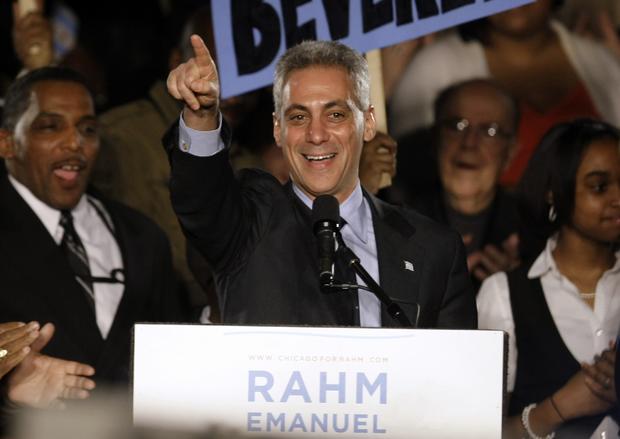Rahm Emanuel readies for hard work as Chicago mayor after victory
His victory was never really in doubt -- only the margin. Had Rahm Emanuel fallen short of 50 per cent of the vote on Tuesday, he would have been forced into an April 5 run-off against the second-place finisher. But it didn't happen. Not by a long shot.
The former White House chief of staff trounced all of his challengers in the race to become Chicago's mayor, racking up huge majorities in most of the city's wards and winning the night with 55 percent of the vote. He will be inaugurated in May as Chicago's first Jewish mayor, replacing Richard M. Daley who, in office since 1989, has been the only mayor many Chicagoans have ever known.
"All I can say , you sure know how to make a guy feel at home," a beaming Emanuel said at his victory celebration at Plumbers Hall. The reference was to a central issue in his campaign: whether Emanuel was authentically Chicagoan and whether, after two years living in Washington and working for President Obama, he fit the residency requirements to run for mayor. The Illinois Supreme Court ruled earlier this month that he did.
"Because of the people of Chicago," Emanuel said, "this is the warmest place in America."
Mr. Obama joined in the celebration by sending a congratulatory telegram to his former aide and a message to his home town:
"I want to extend my congratulations to Rahm Emanuel on a well-deserved victory tonight," the president said. "As a Chicagoan and a friend, I couldn't be prouder. Rahm will be a terrific mayor for all the people of Chicago."
Now comes the hard part. Chicago is a city beset by the recession, concentrations of extremely violent neighborhoods, a budget deficit and chronically under-performing public schools. Emanuel wants to lengthen the school day and year.
Known for his trademark pugnacity, Emanuel ran a campaign that was based on bringing the city together to work on all of those problems in a joint effort. In his victory remarks, Emanuel dealt extensively with the persistently high levels of crime in some of the city's most forlorn neighborhoods. By most comparisons to other big urban areas in the country, Chicago's police force is under-staffed. The mayor-elect has promised to get 1,000 more police officers on the streets by shifting some off desk jobs and by hiring others.
"We have not won anything until a child can go to school and not think of their safety -- we have not won anything. Until a parent can think of their work, and not where they're going to find work, we have not won anything," he said. "The plural pronoun of 'we' is how we're going to meet the challenges. ... I do not want to see another child's name in memorial killed by violence."
Mirroring the budget mess that has befallen states and cities across the country, Chicago was going to face some belt-tightening by whomever won this race. Emanuel has talked of saving $500 million through budgetary moves that involve an overhaul of the city's large bureaucracy. He also campaigned on pressing for benefit cuts from city workers, asking them to bear a larger burden involving health care costs and pension funding.
Emanuel amassed a huge campaign war chest for the race, upwards of $12 million. He can now be expected to shift some of the money he didn't spend to the aldermanic runoff races to help his favored candidates and shape a City Council more to his liking and better able to take on some of the old lions who have prowled the halls of power since Emanuel was in grade school here. City Hall without Daley on the fifth floor will take some adjusting to.
His victory was assured in large part from the outset, and helped immeasurably along the way by the missteps of his opponents, especially former U.S. Senator Carol Moseley Braun. Her debate performances were deemed intemperate by pundits in this town. When in a debate she called a fellow African-American candidate an erstwhile crack user, Braun's standing within the city's black wards plummeted. Analysts said much of her support shifted to Emanuel -- perhaps enough to allow him to avoid that dreaded run-off.
The cheers and smiles of election night will no doubt fade over time. But in the full flush of victory, this often dour and confrontational man promised a new and positive future for Chicago.
"I am determined, with your help, to meet our challenges head-on and make our city even greater," he said.
